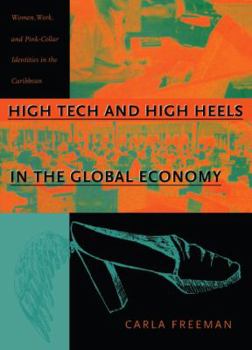High Tech and High Heels in the Global Economy: Women, Work, and Pink-Collar Identities in the Caribbean
Select Format
Select Condition 
Book Overview
High Tech and High Heels in the Global Economy is an ethnography of globalization positioned at the intersection between political economy and cultural studies. Carla Freeman's fieldwork in Barbados grounds the processes of transnational capitalism--production, consumption, and the crafting of modern identities--in the lives of Afro-Caribbean women working in a new high-tech industry called "informatics." It places gender at the center of transnational analysis, and local Caribbean culture and history at the center of global studies.
Freeman examines the expansion of the global assembly line into the realm of computer-based work, and focuses specifically on the incorporation of young Barbadian women into these high-tech informatics jobs. As such, Caribbean women are seen as integral not simply to the workings of globalization but as helping to shape its very form. Through the enactment of "professionalism" in both appearances and labor practices, and by insisting that motherhood and work go hand in hand, they re-define the companies' profile of "ideal" workers and create their own "pink-collar" identities. Through new modes of dress and imagemaking, the informatics workers seek to distinguish themselves from factory workers, and to achieve these new modes of consumption, they engage in a wide array of extra income earning activities. Freeman argues that for the new Barbadian pink-collar workers, the globalization of production cannot be viewed apart from the globalization of consumption. In doing so, she shows the connections between formal and informal economies, and challenges long-standing oppositions between first world consumers and third world producers, as well as white-collar and blue-collar labor.
Written in a style that allows the voices of the pink-collar workers to demonstrate the simultaneous burdens and pleasures of their work, High Tech and High Heels in the Global Economy will appeal to scholars and students in a wide range of disciplines, including anthropology, cultural studies, sociology, women's studies, political economy, and Caribbean studies, as well as labor and postcolonial studies.
Freeman examines the expansion of the global assembly line into the realm of computer-based work, and focuses specifically on the incorporation of young Barbadian women into these high-tech informatics jobs. As such, Caribbean women are seen as integral not simply to the workings of globalization but as helping to shape its very form. Through the enactment of "professionalism" in both appearances and labor practices, and by insisting that motherhood and work go hand in hand, they re-define the companies' profile of "ideal" workers and create their own "pink-collar" identities. Through new modes of dress and imagemaking, the informatics workers seek to distinguish themselves from factory workers, and to achieve these new modes of consumption, they engage in a wide array of extra income earning activities. Freeman argues that for the new Barbadian pink-collar workers, the globalization of production cannot be viewed apart from the globalization of consumption. In doing so, she shows the connections between formal and informal economies, and challenges long-standing oppositions between first world consumers and third world producers, as well as white-collar and blue-collar labor.
Written in a style that allows the voices of the pink-collar workers to demonstrate the simultaneous burdens and pleasures of their work, High Tech and High Heels in the Global Economy will appeal to scholars and students in a wide range of disciplines, including anthropology, cultural studies, sociology, women's studies, political economy, and Caribbean studies, as well as labor and postcolonial studies.
Format:Paperback
Language:English
ISBN:0822324393
ISBN13:9780822324393
Release Date:March 2000
Publisher:Duke University Press
Length:352 Pages
Weight:1.20 lbs.
Dimensions:1.0" x 6.1" x 8.5"
Customer Reviews
1 rating
Globalization and Transnationalism in Anthropological light
Published by Thriftbooks.com User , 23 years ago
High Tech and High Heels in the Global Economy is an ethnography of globalization positioned at the intersection between political economy and cultural studies. Carla Freemans's fieldwork in Barbados grounds the process of transnational capitalism - production, consumption, and the crafting of modern identities in the lives of Afro-Carribean women working in a new high tech industry called "informatics". It places gender at the center of transnational analysis and local Caribbean culture and history at the center of global studies. Freeman examines the expansion of the global assembly line into the realm of computer-based work; focusing on specification of the incorporation of young Barbadian women into high-tech infomatic jobs. These women workers are not simply integral to the workings of globalization but help to shape it's very form. By the inactment of "professionalism" in both appearance and lobor practices, and by their insistence that motherhood and work go hand in hand, they redifine the corporate profile of "ideal" workers and create their own "pink-collar" identity. Through new modes of dress and image making, the informatics workers seek to distinguish themselbes from factory workers, and to adopt new modes of consumption, they engage in a variety of extra income-earning activities. Freeman argues that for the new Barbadian pink-collar workers, the globalization of production cannot be viewd apart from the globalization of consumption. By showing the connections between formal and informal economies, she challenges long-standing oppositions between first world consumers and third word producers and between white collar and blue collar labor. She does so quite elogantly and educationaly in a way that is a refreshing change from traditional ethnographic work. I would truly recommend this literature as it appeals to anthropological scholars and students, Women, and Carribbean fields of study.






